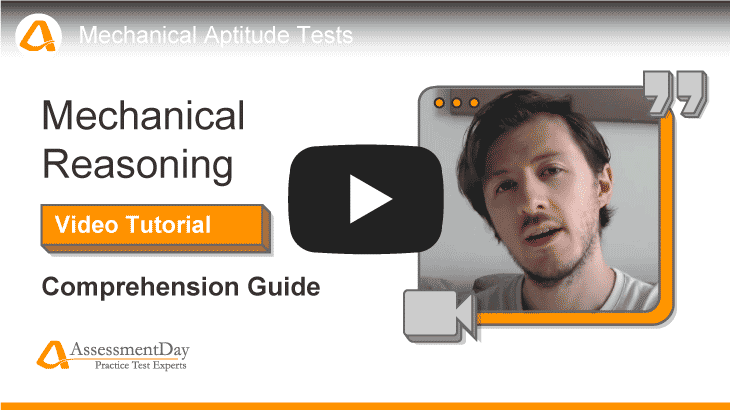Mechanical Reasoning Tests
Practice tests, solutions, and tips to help you pass employers' mechanical reasoning tests.



Updated:
Page contents:
Jump to:Looking to hire?
We recommend Test Partnership for companies seeking reliable hiring tests.

What are mechanical reasoning tests and when are they used?
Mechanical reasoning tests are generally used during the selection or recruitment process for jobs related to engineering, the emergency services and the army, amongst many others. They are typically used to assess how well an individual can apply reasoning in a practical environment.
Did You Know?
Candidates will often be required to answer questions based on a variety of topics, such as: Electrical circuits, Pulleys, Levers, Springs, Tools, Gears and Maps. It is important that you have a good knowledge of each of these areas, and the basic principles within them; although it is highly unlikely that candidates would have reached this stage of recruitment without any knowledge or experience of these.
If you have been asked to take a mechanical-reasoning test it is likely to cover the following topics:
- Forces
- Pressure and sound energy
- Temperature and heat transfer
- Material properties
- Momentum and kinetic energy
- Fluid dynamics
Candidates typically receive an image depicting a mechanical scenario or problem, likely to include kinetic/potential energy, friction and forces etc., for which a related question will be asked. In some questions, candidates may also need to identify the most appropriate tool to use in order to complete a specific job. Mechanical reasoning tests are also likely to be specific to the sector applied for; meaning that applications for a role with the police will often include questions that refer to problems or scenarios that the police are likely to encounter.
Take a free mechanical reasoning test
Free Mechanical Reasoning Test
FreeFree sample mechanical reasoning test containing 10 questions. You have 8 minutes to correctly answer as many as you can..
Mechanical Comprehension Video Guide
The following video is an overview comprehension guide video tutorial to gain some understanding of the types of questions on the mechanical reasoning test.

Well known mechanical reasoning tests include:
- Bennett Test of Mechanical Comprehension: This test is generally used for engineering and mechanical occupations, and measures the ability to comprehend how physical force affects mechanics.
- Wiesen Test of Mechanical Aptitude: This is likely to be used in candidate selection for occupations that require the ability to operate and service tools and machinery; and measures this ability within its assessment.
- Barron's Test of Mechanical Aptitude: Typically used in selection procedures for the military, this test assesses candidates based on subjects related to the abilities a person would need to succeed in this occupation.
- Stenquist Test of Mechanical Aptitude: This test does not require experience in a particular area; it is based around questions in which the candidate has to pick one of four pictures that best fits with a picture they are previously shown.
- SHL Mechanical Comprehension Test: This test is designed to assess your understanding of mechanical laws. Evaluating your ability to know how to use and perform maintenance on machinery. More on SHL mechanical test ➡️
- Test Partnership Mechanical Test: This bespoke test designed for the UK Fire Service covers operative knowledge set in a firefighting setting. Covers things like heat transfer, material properties, forces, and fluid dynamics.
Start practising quality tests with a free account
Practice makes perfect
- Learn from detailed solutions
- Track your progress

Approaching mechanical reasoning tests
Mechanical reasoning tests are considered to be a great predictor of how employees will later perform at work. As with all tests, practising will help you to become more adept at answering these types of questions, and help you to become quicker and more accurate in your responses.
Did You Know?
The tests are timed, so being able to quickly answer the question is beneficial, although these types of tests generally have a 1-5% full completion rate, so getting to the end of the assessment is not as important as the amount of correct answers you provide.
For roles that require mechanical reasoning tests, the candidate would be likely to have knowledge of the principles and formulas required to answer the questions, so there is no need to worry about receiving mechanical reasoning questions if you are entering into an unrelated sector, such as accountancy.